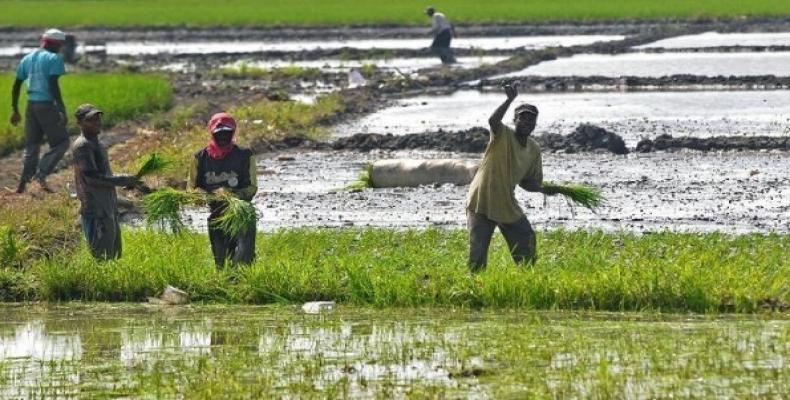Monti Cristi, July 14 (teleSUR-RHC)-- Historic drought conditions in the Caribbean are causing huge losses for farmers as the region suffers the driest season in more than five years.
Rice farmers in the Dominican Republic's northwestern province of Monti Cristi expect they could lose as much as 80 percent of their harvests this season. Their rice crops, grown by maintaining flooded fields, are hardest hit by the dry weather. "We want to tell the president to come to the aid of Monte Cristi, especially rice farmers,” said Quilvo Diaz, president of an irrigation board in the province, according to local newspaper Diario Libre. “Here, in one way or another, all households depend on agriculture.”
Rice is a key source of livelihood for hundreds of families in Monte Cristi alone. But parched reservoirs and lack of rain has left irrigation systems thirsty, creating a difficult situation for farmers, who have called on the government to help avoid crop loss. According to farmers, the situation could cause an “extraordinary famine” in the region.
In Jamaica, the ministry of agriculture has already handed over 30 tanks of water to agricultural producers southwest of Kingston to help ward of the damaging impacts of months of drought.
Meanwhile, the drought in El Salvador is also impacting thousands of producers over an estimated 100,000 acres of farmland sewn with corn, a major staple grain in the Central American country, Prensa Latina reported Tuesday.
To confront the crisis, the Salvadoran government will distribute hundreds of thousands of seed packages for farmers, including improved corn seed packets, bean packets, and sorghum. Authorities will also mitigate potential food shortages by importing 100,000 tons of corn for human consumption, analyst Cesar Villalona told Prensa Latina.
According to Villalona, government support for agriculture has helped El Salvador increase corn and bean production in recent years despite experiencing significant droughts in 2011 and 2014 and major flood-inducing storms in 2009 and 2012.
In the face of climate change, such government support and new policies addressing water, food security, and food sovereignty will only become more important as adverse weather conditions become more common, Villalona explained.
Meteorologists have predicted a strong El Niño effect will disrupt regular climate patterns this year, as the climatic phenomenon originating in the Pacific Ocean triggers floods, droughts, and other extreme conditions around the world.


